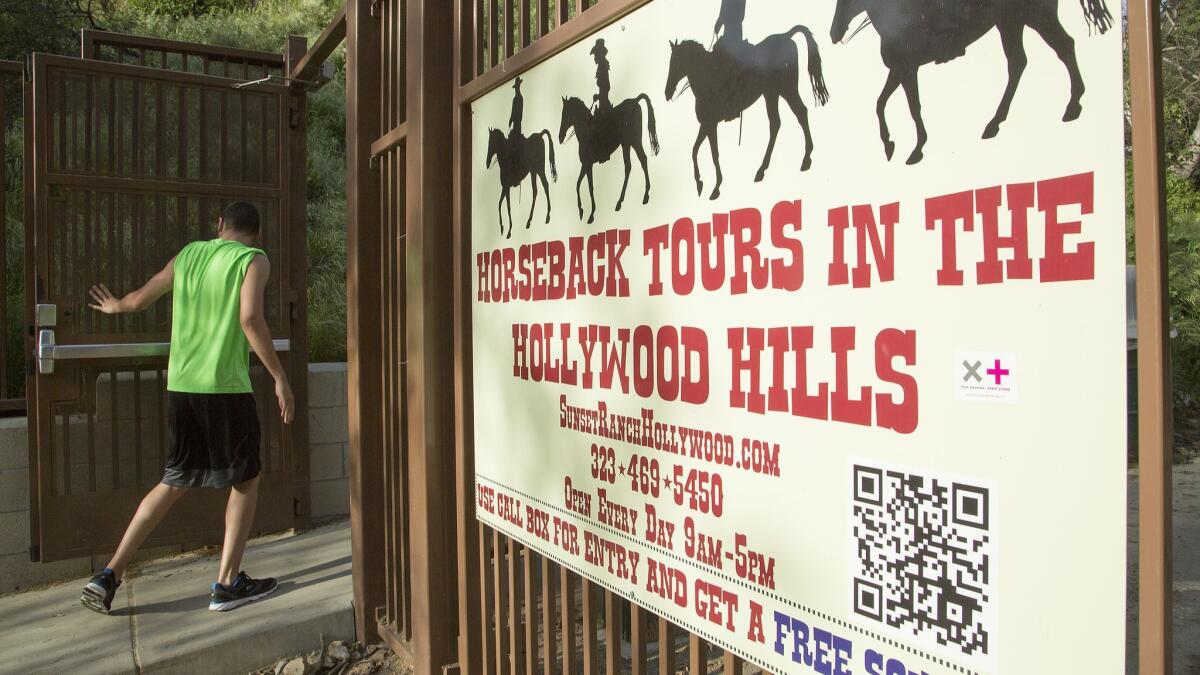Griffith Park groups lose legal battle over pathway to see Hollywood sign

- Share via
Community groups lost a legal battle Thursday to reopen a pathway into Griffith Park that had been popular with hikers and tourists trekking to see the Hollywood sign.
Los Angeles Superior Court Judge James Chalfant ruled that the city had not broken the law when it locked the Beachwood Drive entrance gate to pedestrians last year.
The city locked the gate after being sued by Sunset Ranch Hollywood Stables, which argued that L.A. had blocked its business and put people at risk as thousands of hikers were funneled onto a winding access road leading to its facility. The ranch has long had a right-of-way agreement, or easement, that allows staff and customers to cross city property.
Shutting the entrance gate was applauded by some Beachwood Canyon homeowners who had complained about traffic, fire hazards and other dangers from the crowds of tourists hiking up their street to the Hollyridge Trail.
But it drew protests from other Angelenos who complained that the city had eliminated a key way to access the park. A trio of local groups sued the city, alleging it had flouted state and local laws when it closed the gate to pedestrians.
The Friends of Griffith Park, the Los Feliz Oaks Homeowners Assn. and the Griffith J. Griffith Charitable Trust argued that any decision on how people access Griffith Park must be made by a city commission at a public hearing.
In a court filing, their attorneys contended that the city had many ways to stop interfering with ranch access, but “it chose to violate its charter and code to resolve the dispute.”
Even “when the city has so much as changed the hours a park entrance is open, it has required the public vote of the Recreation and Park Commission,” attorneys Mitchell Tsai and Mike Gatto wrote.
City attorneys countered that Los Angeles was “well within its legal authority” to lock the gate, saying in a legal filing that it was a reasonable way to comply with a ruling that found the city had interfered with access to Sunset Ranch. The parks department did not need commission approval to make that decision, they argued.
In court documents, the attorneys added that hikers and tourists still have other ways to reach the Hollyridge Trail, and “the city continues to explore alternative access concepts.” At the Thursday hearing, Deputy City Atty. Robert Mahlowitz added that the city was open to having the parks commission look at possible options in the future.
Chalfant concluded that locking the gate was not a strategic decision that had to be made by the commission, but an operational matter that could be handled by the department. He said it would be impossible for the parks commission to hold a public hearing on every decision about the day-to-day operations of L.A. parks.
Chalfant added that the decision to lock the gate is not final, noting that the Sunset Ranch case is still ongoing.
The three groups that lodged the lawsuit have yet to decide whether to appeal, Gatto said after the Thursday hearing.
“Obviously we’re disappointed,” said Marian Dodge, president of Friends of Griffith Park. The group “supports public access at public parks.”
Last year, representatives of Sunset Ranch complained that hikers were still getting in at the Beachwood Drive gate by propping it open, waiting to enter as other people exited, or climbing over and unlocking it for other pedestrians. It argued that L.A. was in violation of the court order and should be ordered to permanently prevent the pedestrian gate from opening, possibly by chaining or welding it shut.
The city said it couldn’t do that because it risked trapping hikers trying to escape in a wildfire or other emergency. A judge rejected the request from Sunset Ranch in August, finding that the city had not shown “willful disobedience” with the court order.
Twitter: @AlpertReyes
More to Read
Sign up for Essential California
The most important California stories and recommendations in your inbox every morning.
You may occasionally receive promotional content from the Los Angeles Times.














